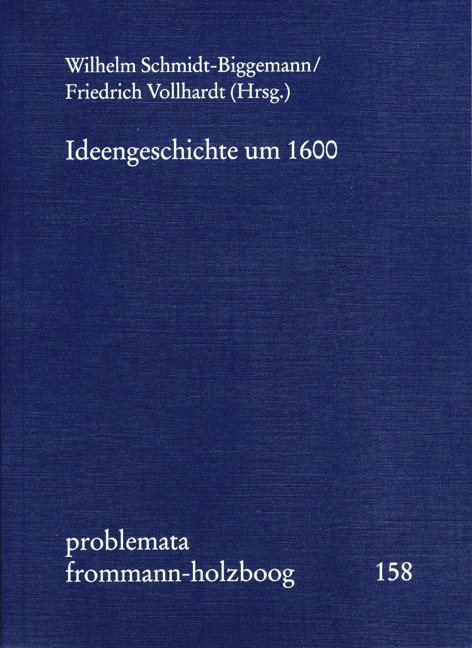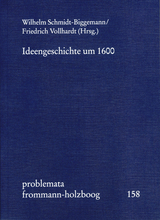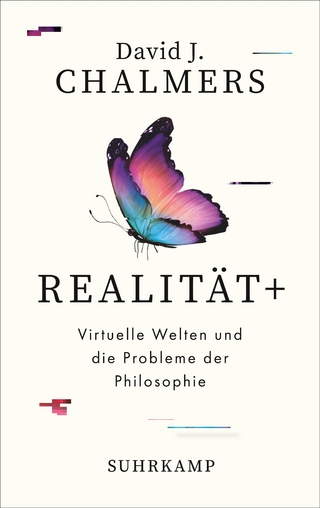Ideengeschichte um 1600
Inhalt:
Claudia Olk: Shakespeare und die Religion – Hamlets Eschatologie
Friedrich Vollhardt: Zweite Reformation? Die Mystik des späten Mittelalters und der Spiritualismus um 1600
Norbert Brieskorn: Robert Bellarmin SJ (1542–1621). Leben, Werke, Grundgedanken
Gideon Stiening: Politische Theologie als Lösung und Problem. Francisco Suárez' ›De legibus ac Deo legislatore‹ als Krisenphänomen und Befriedungsangebot
Cecilia Muratori: Die Utopie der Politik um 1600: Europa und die Welt in der deutschen Rezeption Tommaso Campanellas
Wilhelm Schmidt-Biggemann: Robert Fludds Streit mit Johannes Kepler
Volkhard Wels: Die Frömmigkeit der Rosenkreuzer-Manifeste
Günther Bonheim: Jacob Böhme – ein Naturmystiker?
Sascha Salatowsky: Die Entlastung Gottes. Sozzini, Vorstius und die Folgen ihrer Theologie
Wilhelm Kühlmann: Deutschland als Augiasstall. Synkretistisches Reformbegehren und Theologie der Natur vor dem Dreißigjährigen Krieg
Johann Anselm Steiger: Johann Arndts ›Ikonographia‹ (1597) als Beitrag zur frühneuzeitlichlutherischen Bildtheologie
»Der Band [...] erhellt eine Reihe von wichtigen Aspekten der intellektuellen Diskussion der frühen Neuzeit. Es gelingt den Verfassern der Beiträge, die Zeit um 1600 als eine durchaus spannende, konfliktreiche und dynamische Epoche der europäischen Ideengeschichte darzustellen.« Bo Andersson, Studia Neophilologia
»Der Band [...] erhellt eine Reihe von wichtigen Aspekten der intellektuellen Diskussion der frühen Neuzeit. Es gelingt den Verfassern der Beiträge, die Zeit um 1600 als eine durchaus spannende, konfliktreiche und dynamische Epoche der europäischen Ideengeschichte darzustellen.« Bo Andersson, Studia Neophilologia
| Erscheinungsdatum | 13.01.2017 |
|---|---|
| Reihe/Serie | problemata ; 158 |
| Co-Autor | Günter Bonheim, Norbert Brieskorn, Wilhelm Kühlmann, Cecilia Muratori, Claudia Olk, Sascha Salatowsky, Wilhelm Schmidt-Biggemann, Johann Anselm Steiger, Gideon Stiening, Friedrich Vollhardt, Volkhard Wels |
| Verlagsort | Stuttgart-Bad Cannstatt |
| Sprache | deutsch |
| Maße | 148 x 205 mm |
| Gewicht | 484 g |
| Einbandart | Paperback |
| Themenwelt | Geisteswissenschaften ► Philosophie ► Metaphysik / Ontologie |
| Schlagworte | 1600 • 1600; Geistes-/Kultur-Geschichte • Anthropologie • Ästhetik • Böhme, Jakob • Dreißigjähriger Krieg • erste Hälfte 17. Jahrhundert (1600 bis 1650 n. Chr • Hermeneutik • Hermetik • Ideengeschichte • Ideengeschichte, Geistesgeschichte • Katholizismus, römisch-katholische Kirche • Konfessionalisierung • Magie, Alchemie und Hermetik • Metaphysik • Metaphysik und Ontologie • Mystik • Neuplatonismus • Philosophie • Philosophiegeschichte • Protestantismus, evangelische und protestantische • Reformation • Religionsgeschichte • Religion und Politik • Rosenkreuzer • Schulmetaphysik • Spätaufklärung • Späthumanismus • Theologie • zweite Hälfte 16. Jahrhundert (1550 bis 1599 n. Ch |
| ISBN-10 | 3-7728-2713-6 / 3772827136 |
| ISBN-13 | 978-3-7728-2713-6 / 9783772827136 |
| Zustand | Neuware |
| Haben Sie eine Frage zum Produkt? |
aus dem Bereich




